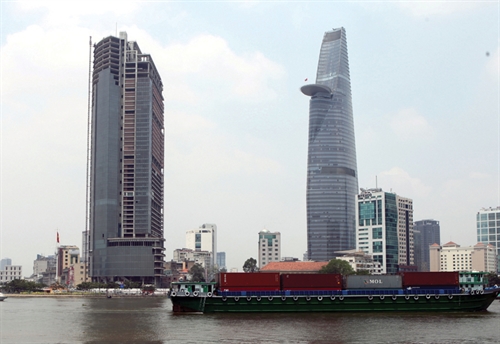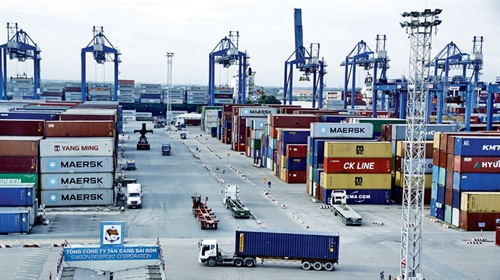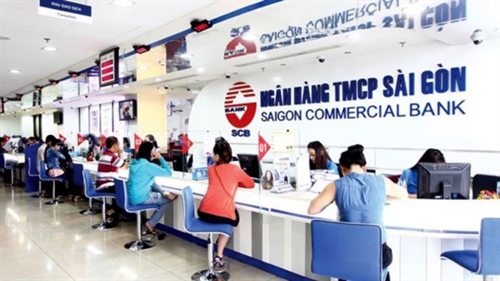Bui Duc Giang
Attorney at law and PhD in law[1]
Resolution No. 42/2017/QH14 on trial dealing with non-performing loans of credit institutions (Resolution 42) was passed on June 21, 2017, by the National Assembly. It took effect on August 15, 2017, and remains in force for five years from that date. The resolution is a long-awaited text and expected to help credit institutions to better deal with their non-performing loans. A significant number of provisions of this text are about secured transactions which are at the heart of the process of recovery of bank loans for the time being. This article tries to give an overview of the text.
Many new provisions but…
Article 10 of Resolution 42 addresses the realization of secured property being real estate projects. As this article does not say that real estate projects subject to the charge must necessarily be housing projects, it seems to indirectly recognize the validity of charges over other types of real estate projects such as projects for construction of hotels, resorts, factories and hydropower plants. It should be noted that the general law of security[2] remains unclear in this regard. Although certain specific regulations[3] consider projects as a category of property, such approach remains questionable. Rather, a charge would attach to rights arising from contracts under a specific project.
On enforcement of security over a real estate project, a credit institution will sell (transfer) that real estate project to a third party. In this regard, Article 10.2 of Resolution 42 says that “the transferee of the project must satisfy the conditions prescribed by the law on real estate business; and shall take over the rights and obligations of the project owner and conduct procedures to continue the project implementation in accordance with the law on investment and law on construction”. Compared to the law on housing, this provision is more flexible and more suitable for realization of the charged project since under Article 149.2 of November 25, 2014.
Law 65/2014/QH13 on Housing, in addition to the requirement that the transferee meets all the requirements to become the owner of a housing project, registration must be carried out with the competent state agency in charge of allocating projects, which is often seen as a compulsory step prior to the signing of the project transfer agreement.
It is notable that Article 7 of Resolution 42 officially recognizes the secured creditor’s right to take possession of the secured property. Under this article, the credit institution may exercise this right on enforcement if (i) an enforcement power arises pursuant to Article 299 of the 2015 Civil Code[4]; (ii) the security contract contains a provision that the securing party agrees that the credit institution has the right to take possession of the secured property on enforcement; (iii) the security transaction has been duly registered; (iv) the security property is not the subject of dispute in a court case for which jurisdiction has been accepted and the case remains unsettled or is currently being settled by a competent court; and is not the subject of provisional measures; and is not currently subject to seizure measure or any measure to secure judgment execution; (v) the credit institution has fully discharged its obligation to publicly disclose information on the contemplated taking of possession of the secured property.
Whether or not the credit institution has the right to take possession of the secured property (i.e., the charged property) on enforcement remains debatable since the effective date of the 2015 Civil Code (January 1, 2017), mostly because of the vague approach of this Code on the issue.
Amongst the above-mentioned requirements, the requirement of a specific stipulation in the security contract whereby the securing party agrees that the credit institution has the right to take possession of the secured property on enforcement may cause troubles for those credit institutions whose security documents are lacking such a provision. An amendment to that effect will be needed if the credit institution wishes to exercise the right to take possession of the secured property. Likewise, the registration requirement seems incompatible with the right to take possession since the paramount thing is that the security contract is valid (registration will ensure enforceability of the secured transaction against the parties in certain cases and the fact that a security interest has been registered does not necessarily mean the security contract at stake is valid).
It should be noted that Article 7 of Resolution 42 officially provides for (i) the obligation of the commune People’s Committee where the taking of possession takes place to witness and sign the minutes of taking of possession of the secured property in case the securing party fails to cooperate or is not present pursuant to the notice from the credit institution, and (ii) the obligation of the police office in the locality where the taking of possession takes place to ensure security and order during the process of taking of possession at the request of the credit institution.
With regard to court proceedings[5], Article 8 of Resolution 42 expressly provides for the application of summary procedures to settle a dispute over the obligation to handle the secured property to the secured creditor on enforcement or about the credit institution’s right to realize secured property. It is noteworthy that the conditions for the application of summary procedures set forth in this article are not as strict as those provided in the 2015 Civil Procedure Code (notably no need for the interested party - the borrower or the securing party - to have acknowledged his/its obligation). Furthermore, it seems that the summary procedures provided in this article apply not only to cases with simple facts and clear legal relations but also to cases with complicated facts and/or unclear legal relations. However, Resolution 42 remains silent as to when ordinary procedures will apply instead of summary procedures and this is a pity!
 |
| Saigon M&C complex (left), as collateral of Saigon One Tower SJC, is foreclosed by the Vietnam Asset Management Company (VAMC)__Photo: Hoang Hai/VNA |
Other weaknesses?
Article 174.2(d) of Land Law
45/2013/QH13 dated November 29, 2013, (the Land Law) provides that an economic entity to which the State allocates land in consideration of the payment of land use levy or to which the State leases land with land rental payable in lump sum may charge its land use rights with a credit institution licensed to operate in Vietnam. In practice, this provision may be construed in the sense that the secured party must necessarily be a credit institution. In other words, in case a loan secured by the land use right is sold to an entity, such entity must be a credit institution if it desires to benefit from the charge taken by the first credit institution. As such, such entities as Vietnam Asset Management Company (VAMC) or enterprises other than credit institutions may encounter this obstacle.
Article 9.1 of Resolution 42 provides that “the purchaser of a debt […] for which the security property is a land use right, property attached to land or future property attached to land, has the right to take and register a charge over the land use right, property attached to land or future property attached to land being the secured property for the purchased debt”. Article 9.2 further indicates that in this case the purchaser of the debt shall be entitled to “take over the rights and obligations of the chargee”.
The idea of the drafter of Resolution 42 seems to be that the purchaser of debt, that may also be an ordinary enterprise not licensed to trade in debts, will benefit from all security interests attaching to real property that the first credit institution has taken in connection to the loan at stake. This is a notable exception compared to the obstacle contained in the Land Law. Nevertheless, the wording of Article 9.1 is confusing. It should be noted that normally (i) the sale of a debt entails transfer of the security from the seller to the purchaser (and this is not the taking of a (new) security interest) and (ii) as a result, re-registration of the security (to replace the seller’s name by that of the purchaser as secured creditor) will be conducted but not registration of a new security interest.
Article 9.3 of Resolution 42 prescribes that “the organization purchasing, selling and dealing with bad debts shall be entitled to register a charge when taking additional security over the land use rights, property attached to land or future property attached to land with respect to the loan it purchased”. The spirit of this article appears to permit the organization purchasing, selling and dealing with bad debts (being an organization wholly owned by the State and created by the Government to deal with bad debts of credit institutions) to take additional security over real property to secure the debt it has purchased. However, such a principle should have been expressly stated but not in an implied way via the recognition of the possibility to register such additional security as this article does. Likewise, Resolution 42 does not extend this exception by allowing ordinary enterprises which do not operate in debt purchase and sale to take additional security over real property in this case.
One may also be concerned about the scope of application of Resolution 42. Indeed, Article 17.2 of this text states that if there is any discrepancy between the provisions of this Resolution and those of other laws regarding a specific issue, then the provisions of this Resolution shall apply. Under Resolution 42, bad debts include debts belonging to groups 3, 4 and 5 (sub-standard debts, doubtful debts and high-skate debts)[6], (i) arising and considered as being bad debts prior to August 15, 2017; or (ii) arising prior to August 15, 2017, but considered as being bad debts within the effective term of Resolution 42.
Overall, despite certain limitations, the provisions relating to the realization of secured property in Resolution 42 have been drafted in a more detailed and more open manner and appear, to some extent, to be more favorable to credit institutions (as secured creditors) compared to the general law of security. In principle, a credit institution will realize the secured property in case the borrower fails to pay the principal and/or the interest amount(s)[7]. In other words, the credit institution will enforce its security when a debt becomes overdue. Overdue debts include also debts of group 1 (standard debts) and group 2 (debts requiring attention). The co-existence of two legal regimes for enforcement of security for overdue debts is not suitable in the sense that at the end of the day regardless of the fact an overdue debt may fall to one group but not to another, repayment of the secured loan by way of enforcement of security is necessary. The security is a means to the repayment of the secured liability. May one hope that the provisions on realization of secured property in Resolution 42 will give inspirations to the drafters of texts implementing the 2015 Civil Code or of amendments to that Code (to remedy its current gaps and limitations)?-
Government announces state monopoly over 20 goods, services
The Government on August 7 issued a decree on state monopoly over 20 groups of goods and services, including goods and services for national defense and security, production of gold bars, and import of cigarettes and cigars.
According to Decree 94, to take effect from October 1, the manufacture, trading, import-export and transit of industrial explosives; import-export of gold material for production of gold bars; issuance of lottery tickets; and management, import-export, purchase, sale, storage and preservation of goods named in the national reserves list are state-monopolized activities.
The state monopoly also applies to banknote printing and coin minting, issuance of postage stamps, production, import-export, trading, transport and storage of fireworks and provision of firework-related services.
Other activities that fall under exclusive state control include transmission and regulation of the national power grid and construction and operation of multi-purpose hydropower plants and nuclear power facilities of special socio-economic importance.
The services monopolized by the State cover public maritime services such as operation of navigation light systems and public navigable channels, management and operation of coastal information stations, air traffic, aeronautical information and aviation search and rescue services, along with forestry services in special-use forests, excluding those used for tourism purposes.
Management and exploitation, excluding maintenance, of state-invested national and urban railway infrastructure systems; and management and exploitation of inter-provincial and inter-district irrigation works and sea embankments are placed under the State’s exclusive rights.
The monopolized services also include publishing, exclusive of printing and distribution activities; maintenance, management and exploitation of public postal service networks; and provision of public services for newspaper publishing.
Decree 94 states that state monopoly is only established over essential goods and services related to national defense and security or national interests and goods and services in which other economic sectors are not interested or cannot participate.
The geographical area under the state monopoly is the entire territory of Vietnam, according to the decree.
Government authorities can implement the monopoly over the 20 goods and services listed in the decree by themselves or assign other organizations or individuals to do so.
According to the decree, monopolized commercial activities must be implemented under strict surveillance of state management agencies.
Ministries, ministerial-level agencies and local administrations are not permitted to create monopoly over other goods and services. Goods and services related to national defense and security are to be regulated by the Minister of National Defense and Minister of Public Security.
According to the Ministry of Industry and Trade (MOIT), Decree 94 is issued to detail Clause 4, Article 6 of the 2005 Commercial Law which stipulates: “The State may monopolize for a definite period of time commercial activities with respect to a number of goods and services or in a number of geographical areas in order to ensure national interests.”
The decree was designed on the principle of neither expanding nor increasing the number of fields to be monopolized by the State and conforming with the country’s international commitments.
The state monopoly of the goods and services listed in the decree is currently governed by various laws, such as the laws on electricity, postal services, publication, civil aviation, railways, and some government decrees.
The list of 20 goods and services was drawn up based on not only the above regulations but also the country’s international commitments, according to the Ministry.
In the course of implementation, the list may be revised at the proposal of ministries, ministerial-level agencies, provincial administrations to meet state management requirements or of businesses when they wish to participate in, according to the decree.
When the drafting of the decree was in progress, there were worries that the establishment of state monopoly would somehow adversely affect the business environment.
Lawyer Truong Thanh Duc from BASICO Law Firm said the Commercial Law’s provision on state monopoly has been applied for the last 12 years.
“It is the time to review and narrow down the scope of state monopoly in line with the development of a market economy,” he said.
Meanwhile, Dau Anh Tuan, head of the Vietnam Chamber of Commerce and Industry’s Legal Department, said Decree 94 mentions nothing about the period of time for exercising the state monopoly.
It could be understood that the state monopoly may last indefinitely, and this did not conform with the Commercial Law, he said.
Decree 94 retains state monopoly over the production of gold bars and import and export of gold material for this production.
Commenting on this provision, chairman of the Vietnam Gold Trading Association Nguyen Thanh Long said it ran against Government Decree 35 on support for and development of enterprises up to 2020 which says the State guarantees the right to equality for all enterprises, regardless of their type and economic sector in terms of access to capital, resources, land, and investment and business opportunities.
However, banking experts backed the provision, saying that it was a necessary measure to ensure effective state management over gold trading. The production of gold bars and import and export of gold material are actually exclusive activities of the central bank to stabilize the gold market and administer foreign exchange management and, therefore, should not be regarded as business activities.
The issuance of the list would help improve the transparency in state monopoly activities, according to the MOIT.- (VLLF)
l The debtor fails to perform or performs improperly the secured liability when it becomes payable;
l The debtor must early perform the secured liability because of its breach of the contractual obligation(s) or as stipulated by law; and,
l Other circumstances as agreed by the parties or as provided by law.









